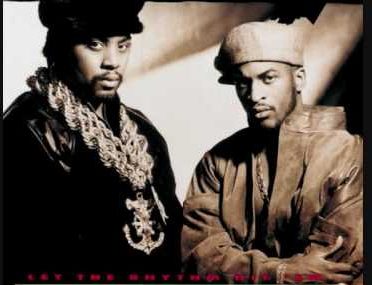Rakim allowed Black urban masculinity to have depth.
Not only did he and his partner let young boys be men without fear, but he and Eric B. also change the way that the public received rap music —content-wise and lyrical-creativity— they gave to the world a treasure chest of intellectualism that mandated that Hip-Hop grows up.
When we first heard Paid in Full, we were hooked on the drug-dealer aesthetic and how he spit with a raw realism that spoke to our desire to be dripped in Dapper Dan’s latest. “Eric B. Is President,” “I Ain’t No Joke,” “I Know You Got Soul,” “Move the Crowd,” and “Paid in Full,” solidified him as the god-emcee, even to the most church-going fan. He seemed god-like and righteous, while still embodying the cool thing that dudes with them dookie rope chains and that trunk jewels do.
By the time the duo gave us Follow the Leader, we were anxiously waiting for their return.
FTL was not better than PIF (it would be blasphemous to even compare), but it was laterally just as powerful. Both offered a cornucopia of vocalization that no one got from RUN-DMC, was not woven into LL Cool J’s superstar persona, and could not be embodied by any other rapper at the time with access to a mic and a beat machine. When “Microphone Fiend,” “Lyrics of Fury,” “The R” and the title jam hit the airwaves or DJ booths, people almost lost their minds trying to figure out not just the genius of Ra’s wordplay. What made it just as powerful as anything on the previous albums was the way that the instrumentation married James Brown’s soul samples with jazz samples from Bob James. The album then slipped to funk musicians like Average White Band and the Funkadelic and pop overtones from Top 40 groups like the Eagles.
So then Let The Rhythm Hit ‘Em comes up, three years from the release of Paid in Full, and what we have here is the same Black excellence that the culture had enjoyed.
But even greater … like the growth from being a sophomore to being a senior … the years of maturation mattered and were apparent. The first thing that should have shaken the rafters for Black people once this dropped was that they decided to drop the classic album on Juneteenth, the day that Black people all over were freed from slavery. It was a declaration of freedom for those of us who loved the music —who were enslaved with one idea of what a hit song sounded like.
The hits from this LTRHE just sounded different.
Appropriately revolutionary, the project of ten tracks of thought worthy audio bliss, became a sacred contract between the Hip-Hop lover and creator. Now, 30 years in tow, the rap community gets to reflect on what “Mahogany” meant to young women, “In the Ghetto” means to young brothers (even now) yearning to be seen outside of the pathology impressed on them by their station in life. Three decades later, fans and music enthusiasts get to delve into a celebration for “Let the Rhythm Hit ‘Em,” like no other piece of art from the era has been.
On Caffeine TV, there will be a two-hour special to salute Eric B and Rakim’s third studio album. Check out the trailer here. Hosted by Headkrack, from The Rickey Smiley Show and Dish Nation, the duo will reveal exactly why the album was different from the first two and how it allowed for them to present themselves as men with really serious content matter. There will be tributes and interviews with guests like Ice T, Fat Joe, Dapper Dan, Chuck D, Jody Watley, and Cornel West, and more. There will also be a live musical performance by Eric B and Rakim.
The presentation will be on Friday, June 19 at 8:30 pm EST/5:30 pm PST. It will on Caffeine.TV on The Leader: https://www.caffeine.tv/TheLeader
